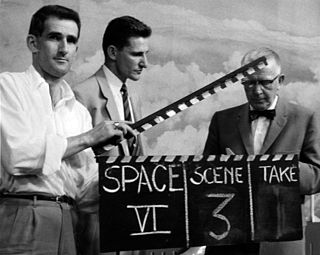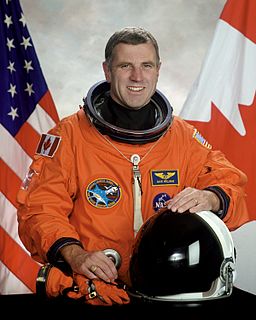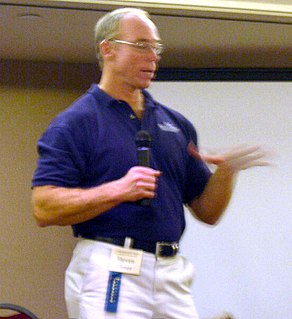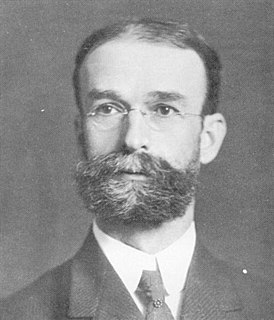A Quote by Hubertus Strughold
The science and technology which have advanced man safely into space have brought about startling medical advances for man on earth. Out of space research have come new knowledge, techniques and instruments which have enabled some bedridden invalids to walk, the totally deaf to hear, the voiceless to talk, and, in the foreseeable future, may even make it possible for the blind to "see."
Quote Topics
Related Quotes
Men can construct a science with very few instruments, or with very plain instruments; but no one on earth could construct a science with unreliable instruments. A man might work out the whole of mathematics with a handful of pebbles, but not with a handful of clay which was always falling apart into new fragments, and falling together into new combinations. A man might measure heaven and earth with a reed, but not with a growing reed.
The apologists for space science always seem over-impressed by engineering trivia and make far too much of non-stick frying pans and perfect ball-bearings. To my mind, the outstanding spin-off from space research is not new technology. The real bonus has been that for the first time in human history we have had a chance to look at the Earth from space, and the information gained from seeing from the outside our azure-green planet in all its global beauty has given rise to a whole new set of questions and answers.
Truly, there are terrible primal arcana of earth which had better be left unknown and unevoked; dread secrets which have nothing to do with man, and which man may learn only in exchange for peace and sanity; cryptic truths which make the knower evermore an alien among his kind, and cause him to walk alone on earth.
In 2009 I went up on the space shuttle. I was in space for 16 days and docked at the space station for 11 days. The entire crew did five space walks, of which I was involved with three of them. When you're doing a space walk, you always have a buddy with you. It's a very dangerous environment when you're doing a space walk.
As long as man was small in numbers and limited in technology, he could realistically regard the earth as an infinite reservoir, an infinite source of inputs and an infinite cesspool for outputs. Today we can no longer make this assumption. Earth has become a space ship, not only in our imagination but also in the hard realities of the social, biological, and physical system in which man is enmeshed.
On my second space walk, I was riding the Canadarm, heading down toward the payload bay of the space shuttle, and I could see the space shuttle highlighted against the Earth in the background, and there was this black, infinite, hostile void of space. I remember looking down at the Earth and thinking, "Beneath me is a 4½-billion-year-old planet, upon which the entire history of the human species has taken place." That was an incredibly humbling moment, and I had a bit of an epiphany.
There is a future which is predictable, programmed, scheduled, foreseeable. But there is a future, l'avenir (to come) which refers to someone who comes whose arrival is totally unexpected. For me, that is the real future. That which is totally unpredictable. The Other who comes without my being able to anticipate their arrival. So if there is a real future, beyond the other known future, it is l'avenir in that it is the coming of the Other when I am completely unable to foresee their arrival.
This is a really big space station. We do a lot of various kinds of work here, different kinds of science experiments; we have over 400 different experiments going on at any one time in different areas, from basic science research to medical technology, that hopefully will benefit more people on Earth.
In space-time everything which for each of us constitutes the past, the present and the future is given en bloc...Each observer, as his time passes, discovers, so to speak, new slices of space-time which appear to him as successive aspects of the material world, though in reality the ensemble of events constituting space-time exist prior to his knowledge of them.
We set sail on this new sea because there is new knowledge to be gained, and new rights to be won, and they must be won and used for the progress of all people. For space science, like nuclear science and technology, has no conscience of its own. Whether it will become a force for good or ill depends on man, and only if the United States occupies a position of preeminence can we help decide whether this new ocean will be a sea of peace or a new terrifying theater of war.





































